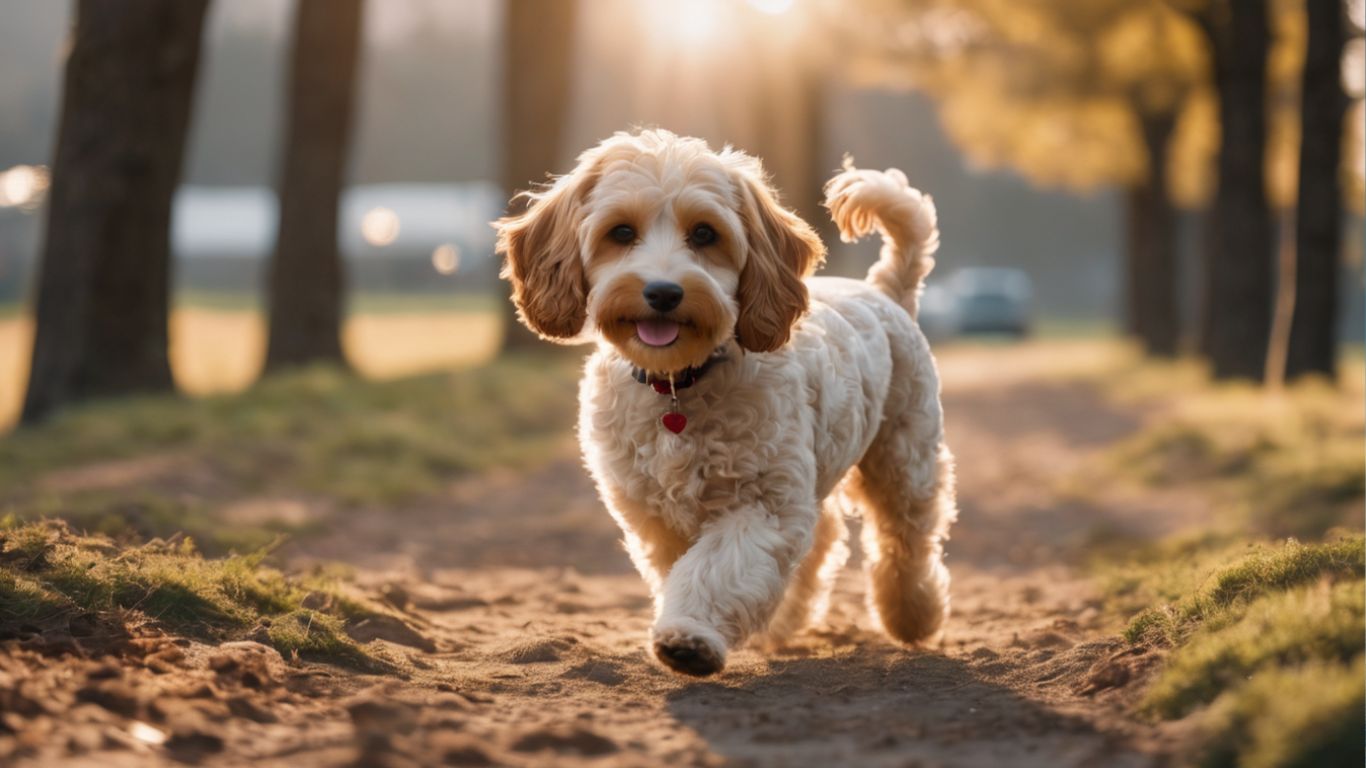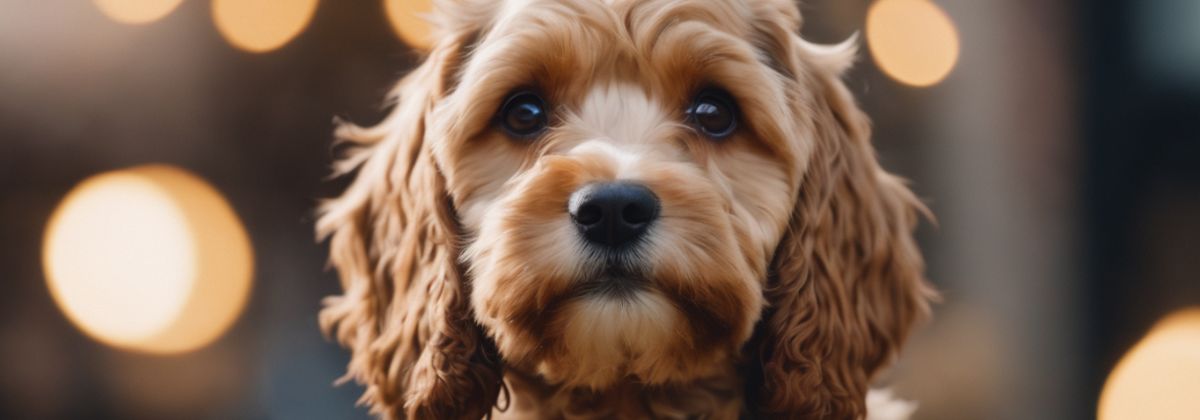17 Feb Cockapoo Dog: A Charming Canine Companion
Cockapoo Dog, a delightful crossbreed of Cocker Spaniel and Poodle, has carved a special place in the hearts of dog enthusiasts worldwide. Famous for their friendly disposition and hypoallergenic coats, these dogs bring joy and companionship to countless households. From their humble beginnings to their popularity in modern culture, this blog aims to provide a comprehensive and engaging insight into the fascinating world of Cockapoos. So, grab your cuppa and let’s dive into the world of these lovable furry friends.
The History and Origin of the Cockapoo Dog
The Cockapoo, a charming and affectionate crossbreed, traces its origins back to deliberate efforts to combine the best traits of two distinct breeds – the Cocker Spaniel and the Poodle. This unique fusion was not merely a coincidence but a purposeful breeding to create a companion dog with a winning combination of intelligence, temperament, and hypoallergenic qualities.
The Cockapoo’s story begins with the desire to develop a dog that retains the gentle nature of the Cocker Spaniel and the intelligence and hypoallergenic coat of the Poodle. This intentional crossbreeding took place in the mid-20th century, gaining momentum as breeders sought to create a canine companion that would appeal to a broad spectrum of potential owners.
As the first-generation offspring of Cocker Spaniels and Poodles, Cockapoos quickly gained popularity for their friendly disposition and versatility. Their success as family pets, coupled with their low-shedding coats, led to the recognition of the Cockapoo as a designer breed. Breeders embraced the challenge of refining and standardising characteristics to meet the demand for these endearing dogs.
Over the years, the Cockapoo’s popularity soared in the UK and globally. The breed’s adaptability to various living environments, coupled with their playful and sociable nature, contributed to their widespread appeal. While not officially recognised by major kennel clubs as a distinct breed, Cockapoos have carved a niche as sought-after companions, finding their way into the hearts of families and individuals alike.
Physical Characteristics of Cockapoos
-
Size, Weight, and Coat Variations
Cockapoos come in a range of sizes, thanks to the variation in their parent breeds. From toy Cockapoos, which can weigh as little as a few kilograms, to standard Cockapoos, which can reach larger sizes, there is a Cockapoo to suit every preference. Their size can vary depending on factors such as genetics and the size of their parents.
One of the most notable features of Cockapoos is their coat, which can exhibit a variety of textures and colours. Some Cockapoos inherit the straight, silky coat of the Cocker Spaniel, while others may have the curly or wavy coat characteristic of Poodles. Common coat colours include black, white, cream, chocolate, and various combinations thereof.
-
Notable Features – Ears, Eyes, and Tail
Cockapoos are known for their expressive features, including their distinctive ears, eyes, and tails. Their ears can vary in shape and size, with some Cockapoos inheriting the long, floppy ears of the Cocker Spaniel, while others may have shorter, more rounded ears reminiscent of the Poodle.
Their eyes are often large, round, and expressive, reflecting their friendly and affectionate nature. Cockapoos are known for their soulful gaze, which has a way of melting the hearts of those around them.
The tail of a Cockapoo is typically long and wagging, reflecting their cheerful and playful disposition. Whether they’re greeting their owners or engaging in a game of fetch, Cockapoos’ tails are always in motion, conveying their joy and enthusiasm for life.

Temperament and Personality
- Affectionate Nature: One of the defining characteristics of Cockapoos is their affectionate disposition. They thrive on human interaction and form strong bonds with their owners, eagerly seeking out opportunities for cuddles and companionship. Whether lounging on the sofa or accompanying their owners on outdoor adventures, Cockapoos exude warmth and devotion.
- Intelligence and Trainability: Cockapoos are highly intelligent dogs, inheriting the smarts of their Poodle ancestors. This intelligence, coupled with their eagerness to please, makes them a joy to train. Cockapoos excel in obedience training and are quick to learn new commands and tricks. Their responsive nature and enthusiasm for learning make training sessions both effective and enjoyable for both the dog and the owner.
- Social Behaviour: Cockapoos are naturally sociable animals, enjoying the company of both humans and other pets. They thrive in environments where they can interact with family members and playmates, displaying a gentle and amiable demeanour in social settings. Cockapoos are known for their friendly approach towards strangers, making them ideal companions for social outings and gatherings.
Training Techniques for Your Cockapoo Companion
- Positive Reinforcement Techniques: Positive reaction encourages your Cockapoo to associate positive outcomes with desired actions, making them more likely to repeat the behaviour.
- Obedience Training: Start with basic obedience commands like sit, stay, and come. Use clear and consistent commands, coupled with positive reinforcement, to reinforce these behaviours. Gradually progress to more advanced commands as your Cockapoo becomes proficient in the basics.
- Socialization: Expose your Cockapoo to various environments, people, and other animals from an early age. This helps them become well-adjusted and comfortable in different situations.
- Consistency is Key: Consistency is crucial in training a Cockapoo. Use the same commands and reward system consistently, so your dog understands what is expected. Inconsistency can confuse your Cockapoo, hindering the learning process.
- Patience and Positive Tone: Maintain a patient and positive tone during training sessions. Cockapoos respond well to a calm and encouraging voice. Avoid using harsh punishments, as this can lead to fear and anxiety, negatively impacting the training experience.
- Interactive Play: Incorporate interactive play into training sessions. This not only reinforces commands but also allows your Cockapoo to burn off excess energy. Use toys and games to make learning fun and engaging.
- Clicker Training: Consider using a clicker as a training aid. Clicker training involves associating the sound of a clicker with positive reinforcement. This precise feedback helps your Cockapoo understand which behaviours are being rewarded.
- Crate Training: Crate training provides a safe and comfortable space for your Cockapoo. Introduce the crate gradually, associate it with positive experiences, and use it as a tool for house training and a secure resting place.
- Regular Exercise: Cockapoos are active dogs that benefit from regular exercise. Incorporate daily walks, play sessions, and mental stimulation activities into their routine.
Grooming Needs of Cockapoo Dog
- Coat Maintenance: Cockapoo dog often inherits a mix of coat characteristics from their Cocker Spaniel and Poodle parentage. So, regular brushing is essential to prevent matting and tangling.
- Bathing: Aim for a bath every four to six weeks, or as needed, depending on their activity level and exposure to outdoor elements. Also, use a mild dog shampoo to maintain their coat’s natural oils and prevent skin irritation.
- Brushing and Trimming: Cockapoos may require occasional trimming to maintain a tidy appearance. Focus on areas such as around the ears, paws, and tail, where hair tends to grow longer.
- Dental Care: Dental hygiene is crucial for Cockapoos to prevent tooth decay and gum disease. Brush your dog’s teeth regularly using a dog-friendly toothbrush and toothpaste. Dental chews or toys can also aid in keeping their teeth clean and healthy.
- Ear Cleaning: Cockapoos, with their floppy ears, are prone to ear infections. So, check their ears weekly for signs of redness, swelling, or unusual odour.
- Nail Maintenance: Regular nail trimming is essential for Cockapoos to prevent discomfort and potential issues with walking. Trim their nails every few weeks, being cautious not to cut into them quickly. If you’re unsure, a professional groomer can assist with this task.
- Eye Care: Keep an eye on your Cockapoo’s eyes, especially if they have a Cocker Spaniel’s longer hair around the face. Wipe away any tear stains with a damp cloth to prevent staining and irritation.
- Mishka Professional Grooming: Consider scheduling regular visits to our professional groomer for a complete grooming session. Our professional groomers can handle tasks such as full-body trims, sanitary trims, and expressing anal glands, ensuring your Cockapoo receives comprehensive care.
Common Health Issues
- Ear Infections: Cockapoos, with their floppy ears, are susceptible to ear infections. Regularly check their ears for signs of redness, swelling, or an unpleasant odour. So, keep the ears clean and dry, and consult with your veterinarian if you notice any abnormalities.
- Dental Problems: Dental hygiene is a crucial aspect of Cockapoo care. Due to their small size, they may be prone to dental issues like tooth decay and gum disease.
- Hip Dysplasia: Hip dysplasia, a common orthopaedic issue, can affect Cockapoos. While this may have a genetic component, maintaining a healthy weight, regular exercise, and a balanced diet can contribute to preventing or managing this condition.
- Allergies: Cockapoos, often praised for their hypoallergenic coats, can still experience allergies. Also, skin irritations, itching, or digestive issues may indicate allergic reactions. Identifying and avoiding allergens, along with consulting your vet, can help manage these concerns.
- Luxating Patella: Luxating patella, a condition where the kneecap dislocates, can occur in Cockapoos. Regular exercise, maintaining a healthy weight, and vigilant monitoring for any signs of limping or discomfort can aid in early detection and management.
- Progressive Retinal Atrophy (PRA): PRA is an inherited condition that affects the eyes and can lead to vision loss. So, regular eye check-ups and monitoring for changes in your Cockapoo’s vision can help manage this condition if detected early.
- Obesity: Cockapoos, like many small breeds, can be prone to obesity. A balanced diet and regular exercise are essential to prevent weight-related issues. Be mindful of portion sizes and avoid excessive treats to maintain a healthy weight.
- Hypothyroidism: Hypothyroidism, a condition where the thyroid gland doesn’t produce enough hormones, can affect Cockapoos.
- Cataracts: Cockapoos may be susceptible to cataracts, causing cloudiness in the eye lens. Regular eye check-ups and prompt consultation with a veterinarian can aid in early detection.
The Last Word
Cockapoos emerge as not just pets but cherished family members, embodying a perfect blend of affection, intelligence, and adaptability. From their fascinating origins and charming physical characteristics to their grooming needs and training potential, Cockapoos offer a delightful canine companionship experience. Nurturing their well-being through regular care and awareness of common health issues ensures a fulfilling and enduring bond between these lovable dogs and their devoted owners.




Sorry, the comment form is closed at this time.